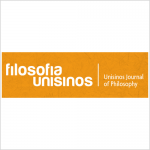Absolute power and moral knowledge
Vol 11, No 2 (2010) • Filosofia Unisinos - Unisinos Journal of Philosophy
Autor: Roberto Hofmeister Pich
Resumo:
In this study, we attempt to obtain a better understanding of the ethical theory of the Franciscan philosopher John Duns Scotus, especially of the so-called “voluntaristic” character of his theory and at the same time of its rational accessibility. In this sense, through a detailed analysis of the distinction between absolute power (potentia absoluta) and ordinate power (potentia ordinata), we wish to clarify what is, for Scotus, the legal or prescriptive character of rules of action and what is the ultimate foundation of moral propositions. For this purpose, the study, which methodologically gives priority to the investigation of the topic departing from Reportatio examinata I d. 44 q. 1, offers initially a discussion of the explicit meaning of potentia absoluta and of potentia ordinata. It then emphasizes the relationship between those two powers and the nature of moral truths and also on two distinctions – referring to precepts of law – that explain how the revocation and the modification of a law or of an established order of laws have a place in the perspective of an absolute legislator.
ISSN: ISSN: 1984-8234
Texto Completo: http://revistas.unisinos.br/index.php/filosofia/article/view/4642
Palavras-Chave: John Duns Scotus,absolute power,ordinate powe

Filosofia Unisinos - Unisinos Journal of Philosophy
The journal Filosofia Unisinos - Unisinos Journal of Philosophy is published once every four months by Universidade do Vale do Rio dos Sinos.
Articles must be original, unpublished, and not under consideration for publication anywhere else and can be written in Portuguese, English or Spanish
Filosofia Unisinos - Unisinos Journal of Philosophy prints articles, translations and critical book reviews. It also reprints papers that are considered fundamental to the area when authorized written permission is given by the original publisher.
